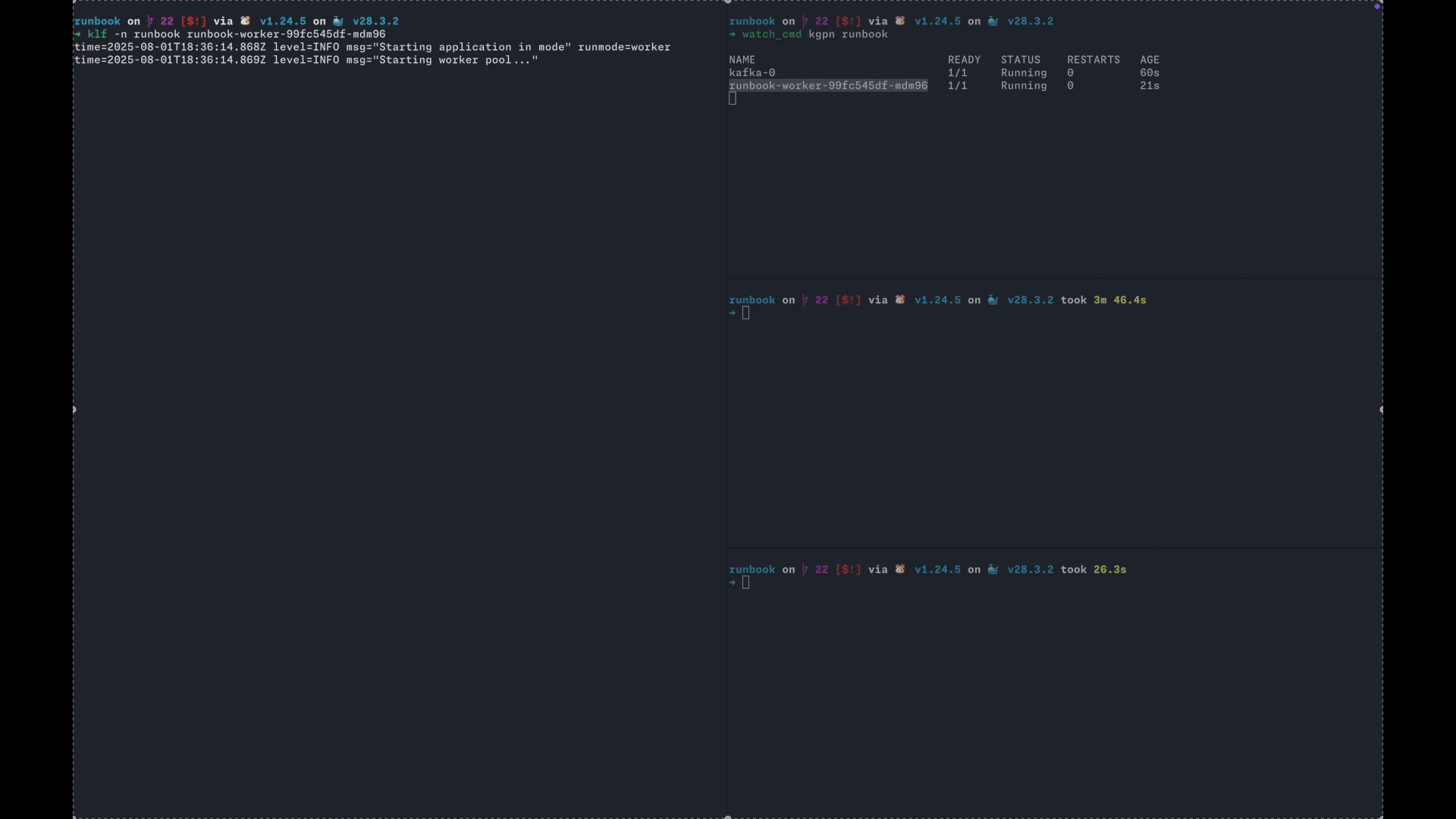Previous notes:
After merging last week’s Pull Requests, written half-drunk on my patented Ironwort tea cocktail, I’m proud to announce:
Runbook is now a Cloud-Native, Event-Driven, and Infrastructure-Agnostic orchestrator for Ephemeral, Distributed Workloads.
🧠 Built for multi-tenancy, fault-tolerance, and high-concurrency execution. IT SCALES!
🛡️ Security by design: containerized, sandboxed, demure
🗒️ Designed around declarative YAML workflows
🚀 Zero lock-in. Born to be wild run anywhere
It’s not just orchestration. It’s orchestration done right™️
It surely reads like a buzzword checklist, but every box is checked for a reason. It’s been event-driven since day one; distributed by design; and runs stateless workloads that vanish when they’re done: ephemeral by nature. Now it runs on Kubernetes, the epitome of Cloud Nativeness. This is the result of deferring decisions that didn’t need to be made yet, just like I mentioned in the previous note. And yeah, I learned (and broke) a few things along the way.
Anyway here’s the graph of a sample workflow:
╭────╮
╭──▶│ C │───╮
│ ╰────╯ │
│ ▼
╭─────┴───╮ ╭───────╮
│ A ├────▶│ D │
╰─────────╯ └───────┘
│
▼
╭────────╮ ╭────────╮
│ B ├────▶│ E │
╰────────╯ └────────╯
And here’s a sample run of that same workflow in K8s:

Kubernetes broke my Orchestration
I added a YAML parser to Runbook since day one. When I started working on K8s, I noticed the K8s Go client also has a YAML parser included. So I forgot the good ol’ “Don’t fix what’s not broken” mantra and decided to use this new parser instead of the old one. Because why have 2 thing when 1 thing do trick.
For reference, here’s how a very basic Runbook YAML definition looks like:
name: "Default Runbook Workflow"
steps:
- name: "Step A"
env:
SOME_ENVVAR: "value"
command: printenv
- name: "B"
command: |
echo "Look busy..."
sleep 50
- name: "C"
depends_on:
- "Step A"
- B
command: echo "Step with dependencies"workflow.ymlAnd here’s the code diff for switching from my previous YAML parser to the K8s one:
import "github.com/goccy/go-yaml"
import "k8s.io/apimachinery/pkg/util/yaml"
var runbook types.Runbook
if err := yaml.Unmarshal(ymlFileBytes, &runbook); err != nil {
decoder := yaml.NewYAMLOrJSONDecoder(bytes.NewReader(ymlFileBytes), 4096)
if err := decoder.Decode(&runbook); err != nil {
return fmt.Errorf("%w: %v", types.ErrUnmarshalRunbook, err)
}parser.goThe next day, while doing some routine tests, I noticed all steps were kicking off at once: the step dependencies weren’t being taken into consideration. The workflow orchestrator was broken. Kind of a big deal, when all you have is a workflow orchestrator, right? So I started debugging the orchestration logic, putting logs and breakpoints for everything.
After spending almost half an hour debugging, I thought of logging the steps themselves as they were parsed, right before the orchestrator picked them up for execution. And lo and behold, here’s what I see:
{ Name: "Step A", DependsOn: [], Command: "printenv" }
{ Name: "B", DependsOn: [], Command: "echo \"Look busy...\"\nsleep 50" }
{ Name: "C", DependsOn: [], Command: "echo \"Step with dependencies\"" }No dependencies on step C?! Who’d’ve thunk the K8s YAML parser would mess up parsing arrays… I reverted to the original parser, ran everything again, and I saw the dependencies being loaded correctly. Great success!
Now I’m using 2 parsers: one for parsing my own Runbook definitions, the K8s one to parse K8s YAMLs, and praying the K8s parser can at least parse its own configs properly…
Gains & Losses
When I wrote the previous entry of these Runbook Notes, workflows were executed as Goroutines. It’s easy to control everything when nothing leaves the machine. But now that we’re cloud native, properly distributed, and loaded with buzzwords… you gain some and you lose some.
Moving to K8s Jobs I lost the support for Go contexts: a context getting cancelled doesn’t translate into the pod shutting down. At least not automagically. I had to build my own tooling for that kind of magic.
Another nice feature I lost was log streaming. With steps as goroutines, I could easily set up io.Pipes and stream $stdout and $stderr independently. With K8s jobs, I can only read pod logs as a stream of text, and they don’t come with $stdout/$stderr flavors. I had to build my own tooling for that sort of distinction.
But I’m fine with losing this kind of functionality. You gain some, you lose some. Manual shutdowns and log sorting are the price to pay for a cloud-native, event-driven, and infrastructure-agnostic orchestrator for ephemeral, distributed workloads. The main product right now is the Orchestrator. For everything else, there’s a GitHub issue and a work plan.
BORE: Build Once, Run Everywhere
Reading this blog is a bore, and that’s the same method I’m using to build my too many components of Runbook. What started as a single binary has become 3 binaries in a trench coat, with probably more to come. So instead of having multiple projects and losing track of what is implemented where, I took the “monorepo” approach and pushed it one step further: “monobinary”! My 3 binaries in a trench coat are actually a single large(r) binary, with different modes of execution.
# Instead of:
$ mybin1
$ mybin2
# I do:
$ mybin --runmode mode1
$ mybin --runmode mode2I only have a single build step, and I put the build artifact into different container images for different purposes. Build Once, Run Everywhere. Or to put it in an advertisement-friendly way:
Dare To Be BORE-ing!